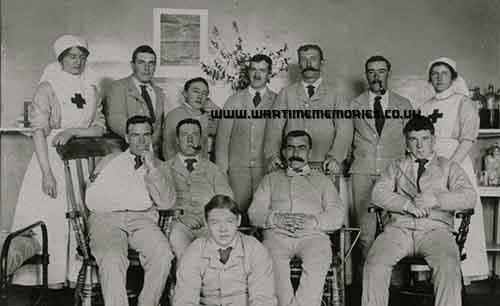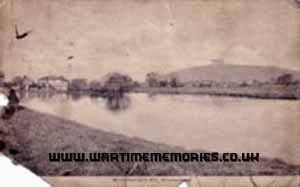Additions will be checked before being published on the website and where possible will be forwarded to the person who submitted the original entries. Your contact details will not be forwarded, but they can send a reply via this messaging system.
please scroll down to send a message
Pte. Alfred "Alf" Grundy
British Army 9th Battalion Rifle Brigade
from:4 Reather St, N Manchester
Alfred Grundy 1892–1959 My paternal grandfather.
Although I was only about 6 years old when “Pop” died, I still have fond memories of visiting him and Grandma Grundy in their Rectory Street house in Middleton, nr Manchester.
The house always had strong pipe-tobacco smell that became very familiar to me. Even though I was still young, I do recall my father telling me his dad never wanted to talk about the war in which he was wounded by shrapnel. I do recall being told the shrapnel was not totally removed and probably contributed to his early demise diagnosed as Toxemia – a condition that results from the spread of bacteria and or toxins in the blood stream. He also had a rare form of abdominal carcinomatosis which likely also contributed to his premature death.
Only later in life did I learn more about his history and participation in WWI. Thanks in large part to a couple of large old family photo albums and a little research I have been able to piece together some of his wartime experiences.
We have several photos of Alf growing up, he being the youngest of 7 children born to James Grundy & Martha Holmes-Elliot of Manchester. The tragic death of two younger siblings to diphtheria meant Alfred grew up 10 years the junior of the youngest of his older siblings. Clearly the “baby” of the family Alfred was an athletic and competitive lad and we have lots of photos of him with his friends in the Hugh Oldham Lad’s Club, including him camping & hiking as well as captaining the football team.
It also appears he was encouraged to be an academic and he studied to become a clerk and by the age of 18 he was working for a Cotton Manufacturer and a little later, the for the Bradford Colliery in a similar position … one he was to return to post war!
We also have a photo of Alf in a group picture at Tatton Park in Cheshire as a member of the young conservatives, so it would seem Alfred also had a political bent. Which in turn may have been his motivation in 1914 to sign up and join the army.
His service record shows he signed up on the 31st of August 1914 and enlisted with the Rifle Brigade. He served with BEF in France and Flanders from 21st May 1915 until the 6th of September 1915. We have some idea of how he arrived in Aldershot to join the garrison formed thanks to a couple of post cards to his young cousin Minnie where he describes a difficult journey that included witnessing the death of a couple of men seemingly from exhaustion!
The post cards tell Minnie he was happy to receive socks from home and that more importantly that he had been chosen to be part of the bugle corps attached with the Rifle Brigade, remarking the change meant he was marching less and his lot in life had changed for the better. ☺
War records suggest he would have left Southampton with his Division between the 18th & 25th of May landing in Le Havre and then on to gather just North West of Omer in or around Watten.
He would probably have been involved when the Expeditionary Force detonated an explosive under the German lines and possibly helped fortify the resulting crater before German forces counter attacked on July 30th by blowing up the Hooge Hotel and followed that with what was described as a “Liquid Fire Attack” and massive artillery bombardment of the trenches. Alf’s 8th Rifle Brigade bore the brunt of the German attack and one can only imagine the horror young men like Alf would have experienced. Less than one year earlier these same young boys had been happy as larks, safe at home working and playing football with their mates!
A British counter-attack on the 31st of July was thwarted by the Germans and losses to the British forces was estimated to be almost 1,000 killed or missing.
I have not found any precise records relating to the actual date of my grandfather’s specific injury but he was listed as "Wounded" on the Casualty List issued by the War Office on 15th August 1915 suggesting it was during the fighting at the end of July and before the 14th Light Division attacked the Germans again in late September.
Alf was eventually returned to England to recuperate and we have photos of him with his right arm in a sling at the Halstead Red Cross VAD in 1915. We have other photo’s of him at the VAD at Earl Colne Priory and then later a great picture of him and fellow injured servicemen in 1916 playing cards at the VAD in Winchester.
He returned to action with his Division on the 20th of February 1918 and, unfortunately for him, he would have been just in time to be involved in the first battle of the Somme in mid March. By the 22nd of March Alf’s 14th Light Division and others were holding a line between St. Quentin and Moy-de-l’Aisne before retreating awaiting reinforcements, which did come and helped push the Germans back.
Between March 21st and April 5th British and allied forces sustained heavy casualties; the 14th Light Division alone had 5,781 men killed or injured during those two weeks! By April 6th the last of the infantry were withdrawn from the front line and given roles in construction or training.
I’m unaware of any further injuries Alf may have sustained but I do know in July of 1918 he was officially transferred to the Labour Corps and assigned a new service number 565938.
He remained in Europe through 29 January 1919 and then transferred to the army reserve on his return to England where he was finally discharged on general demob at the end of March 1920.

.jpg)
